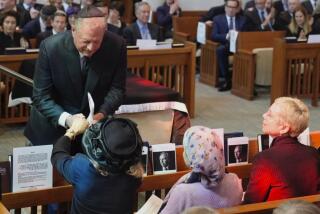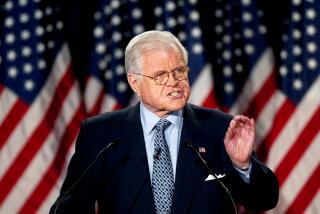Daniel Moynihan, 76; Served 4 Presidents
- Share via
WASHINGTON — Former Sen. Daniel Patrick Moynihan, a scholar-politician who was the only American to have served four successive presidents in high-level positions, died Wednesday afternoon at Washington Hospital Center. He was 76.
Moynihan died as a result of complications stemming from a ruptured appendix, said his former aide, Tony Bullock. He had been in the hospital since March 10.
He had surgery to remove his appendix the next day and appeared to be recovering. But on March 14 he was transferred to the intensive care unit, where he was treated for an infection, pneumonia and low blood pressure.
Moynihan rose from a broken family to become an author, teacher, diplomat and advisor to presidents of both parties. He served in the administrations of Presidents John F. Kennedy, Lyndon B. Johnson, Richard M. Nixon and Gerald R. Ford. He was ambassador to India and to the United Nations. And he wrote or edited 18 books.
President Bush called Moynihan an “intellectual pioneer” committed to freedom for people around the world and equal opportunity for all Americans. “He committed his life to service and will be sorely missed,” Bush said in a statement.
Moynihan spent 24 years in the Senate as a Democrat from New York before retiring from public office in 2000. He then became a senior scholar at the Woodrow Wilson International Center for Scholars in Washington and a professor at Syracuse University.
“He understood that being a U.S. senator was a precious trust,” his successor, Sen. Hillary Rodham Clinton (D-N.Y.) said on the Senate floor in announcing Moynihan’s death. “We have lost a great American.”
Rep. Charles Rangel (D-N.Y.) called Moynihan an “intellectual superstar, and a bona fide expert on both foreign and domestic policy.” Sen. Charles Schumer (D-N.Y.) noted: “It’s very hard to find consensus among 19 million New Yorkers, but just about every one of the 19 million New Yorkers loved Pat Moynihan.”
Former New York City Mayor Rudolph Giuliani said Moynihan established himself “as one of our nation’s most eloquent voices in the quest for a more civil society. Sen. Moynihan was the very example of what a statesman should be.”
Sen. Dianne Feinstein (D-Calif.) said Moynihan was blessed with a brilliant mind and an acerbic wit. “When he left the Senate, we all knew that the place would never be the same without him,” she said. “Now that he has passed on, the same is true of American politics.”
A congressional colleague once called him the “cerebral center” of the Senate, where the 6-foot, 4 1/2-inch former Harvard professor delivered lectures rather than speeches, and defied easy political categorization. His comments were often sprinkled with historical and philosophical references.
He was a leading defender of social welfare programs, even when it put him at odds with President Bill Clinton, a fellow Democrat. And after his retirement from the Senate, he continued to champion efforts to keep Social Security solvent, accepting President Bush’s appointment to head a federal commission on the program’s future.
Although Moynihan was not known for specific legislation, he was influential in shaping the debate.
Sen. Clinton said Moynihan came to the Senate floor armed with three signature items: his horn-rimmed glasses, a bow tie and a great idea.
“His soul was anchored in the New Deal, but it was his ability to enhance that social contract to meet the challenges of the 21st century that helped transform the lives of millions of New Yorkers and Americans,” she said in a statement Wednesday.
“Whether it was Social Security, Medicare, education, health care, the environment, fighting poverty or historic preservation, every issue illustrated what Sen. Moynihan did best: He used the power of an idea as the engine for change.”
As an aide to Nixon, he caused a furor when he recommended a policy of “benign neglect” for dealing with race relations. He contended that the remark was misinterpreted, and that what he was calling for was a cooling off of the inflammatory rhetoric over race.
The Almanac of American Politics once described Moynihan as “the nation’s best thinker among politicians since Lincoln, and its best politician among thinkers since Jefferson.” Or, as Congressional Quarterly’s Politics in America 1994 put it, he was “part Irish bartender, part Harvard professor.”
Philip A. Klinkner, a professor of government at Hamilton College in New York, said Moynihan was an “intellectual giant in the Senate” who, among other things, led the way in the 1960s to a rethinking of the politics and policy of race, welfare and urban life.
Born March 16, 1927, in Tulsa, Okla., Moynihan was 10 when his father, a hard-drinking newspaperman, walked out on the family. At 16, Moynihan became a longshoreman on the piers of New York City’s West Side. He attended City College of New York for one year before enlisting in the Navy, where he served as a gunnery officer. After military service, he went to college on the GI Bill, earning bachelor’s, master’s and doctoral degrees from Tufts University. He also was a Fulbright scholar at the London School of Economics.
He became active in Democratic politics in the 1950s, working on W. Averell Harriman’s successful campaign for governor of New York and later on his staff, where he met his wife-to-be, Elizabeth Brennan.
In 1961, he went to work for Kennedy at the Department of Labor.
After Kennedy’s assassination, he said, “I guess there’s no point in being Irish if you don’t know that the world will break your heart one day.”
He stayed on at the Department of Labor under Johnson.
But even before his famous “benign neglect” memo, he ended up at the center of another race controversy. In 1965, he wrote a report attributing problems among blacks to the deterioration of the family structure. Critics said the report blamed victims for their difficulties.
Years later, Moynihan defended his record on minorities, noting a 1965 speech often called the best civil rights speech President Johnson ever gave.
“Well,” said Moynihan, “I wrote that speech.”
In mid-1965, he ran unsuccessfully for New York City Council president. The next year, he was named director of the Harvard-MIT Joint Center for Urban Studies. In 1969, he returned to Washington as urban affairs advisor to Nixon, who later named him ambassador to India.
During the Ford administration, Moynihan served as ambassador to the United Nations, where he earned a reputation as a staunch defender of Israel, speaking out against a resolution declaring Zionism racism.
At times, he clashed with Secretary of State Henry A. Kissinger.
“I can’t count how many times -- once a month -- either Pat Moynihan or Henry Kissinger was threatening to resign,” Vice President Dick Cheney, another veteran of the Ford administration, recalled at a 1986 meeting of presidential advisors as he reminisced about the “battle of those big egos.”
Moynihan returned to Harvard after only eight months at the United Nations, but politics beckoned. In 1976, he won the Democratic nomination for the U.S. Senate from New York in a contentious primary that included Rep. Bella Abzug and former U.S. Atty. Gen. Ramsey Clark, and easily defeated the incumbent, James Buckley, in November.
He was reelected in 1982, 1988 and 1994 and, though he probably would have won easily, chose not to run for a fifth term in 2000.
Former colleagues on both sides of the aisle remembered Moynihan on Wednesday for his intellect, wit and dedication to public service.
“He brought a breadth of learning, a brand of civility and a respect for the best that government and public service have to offer that is missing more and more today,” said Sen. Patrick Leahy (D-Vt.).
Sen. Trent Lott (R-Miss.) said he loved Moynihan’s knowledge.
“I would just pick a country, say, ‘Tell me about India.’ An hour later, he was still talking,” Lott said.
Though Moynihan held many lofty titles, one of his lesser-known jobs was as staff director of the Ad Hoc Committee on Federal Office Space in 1961. It became the launching pad for his passion for public architecture.
He was a driving force behind the effort to renovate Pennsylvania Avenue, the elegant Washington boulevard that runs in front of the White House.
He also was known for his ill-fated attempt to save New York City’s old Pennsylvania Station from the wreckers. Though he failed in that effort, he led a successful project to convert a post office building built in much the same grand design into a new Penn Station.
In 2000, he was awarded the Medal of Freedom by President Clinton.
Moynihan is survived by his wife of 47 years, Elizabeth Brennan Moynihan; their three grown children, Timothy Patrick, Maura Russell and John McCloskey; and two grandchildren, Michael Patrick Avedon and Zora Olea Moynihan.
A Mass will be said Monday at St. Patrick’s Church in Washington. Burial will be at Arlington National Cemetery.
The family has requested that no flowers be sent and that any donations in Moynihan’s memory be directed to Washington Hospital Center Foundation, c/o Surgical Critical Fund, East Building, Room 1001, 100 Irving St. NW, Washington, D.C. 20010.
More to Read
Get the L.A. Times Politics newsletter
Deeply reported insights into legislation, politics and policy from Sacramento, Washington and beyond. In your inbox twice per week.
You may occasionally receive promotional content from the Los Angeles Times.











